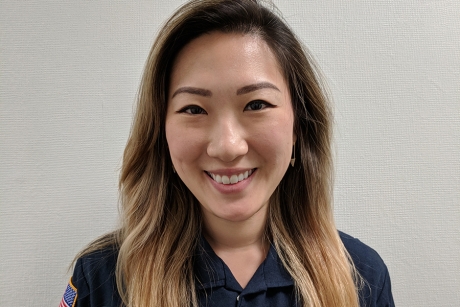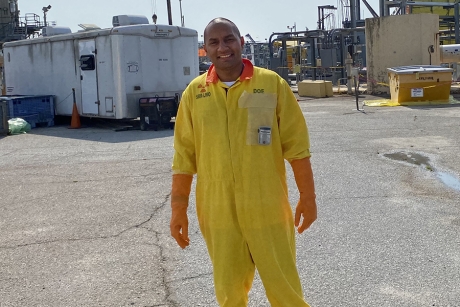Master of Science (MS) in Occupational and Environmental Hygiene
Offered By: Department of Environmental Health and Engineering (Whiting school of engineering)
Onsite | Full-Time or Part-Time | 1.5 years
About the MS in Occupational and Environmental Hygiene Program
This program is part of the Education and Research Center for Occupational Safety and Health (ERC) which is sponsored by the National Institute for Occupational Safety and Health (NIOSH).
The MSOEH is accredited by the Applied and Natural Sciences Accreditation Commission (ANSAC) of the Accreditation Board for Engineering Technology (ABET). It is designed to prepare students to pass the Certified Industrial Hygienist (CIH) examination given by the Board for Global EHS Credentialing
The MSOEH is flexible and can be customized to meet a variety of professional and career goals. Students may enroll in a full-time program or the part-time/online program. Both options confer the same degree and students must meet the same academic requirements.
This degree program is administratively managed through the Whiting School of Engineering. The full-time option is managed through Whiting/Homewood and the part-time option through Whiting’s Engineering for Professionals. All courses are offered through the Bloomberg School of Public Health. Limited funding is available to support full-time students.
Application deadline is June 1. However, we strongly encourage international students to apply no later than May 1 to allow time to secure a visa.
Full-time program (MSOEH)
- June 1 application deadline for a fall start
- Onsite
- 1.5 years to complete
Part-time program (MSOEH)
- Hybrid/online
- Must be completed within 5 years
- Learn more
Certificate in Environmental and Occupational Health
Our certificate is open to degree-seeking students and working professionals.
- Available to degree and non-degree students
- 18 credit hours
- Time to completion is dependent on course selections and offering times
- Tuition is charged at BSPH per credit rate for part-time students.
- Learn More
MS in Occupational and Environmental Hygiene Program Highlights
Funding Available
Limited funding is available for full-time, U.S. students
ABET-Accredited
Join a well-established program with experienced educators and researchers
Hands-on Experience
Apply what you learn in a final project and essay
Part-Time Available
Flexible degree is great for working professionals who want to advance their skills and career
Graduate Spotlights
MSOEH graduates go on to rewarding careers in occupational and environmental hygiene.

Pearl Lee, MS '19
"This master's program has allowed me to meet full-time professionals in the same field who are equally devoted to learning and being the best in their field."

Caleb Ginorio, MS '21
"The long-term professional relationships I formed with classmates and faculty members at JHU continue to be essential to my career."
What Can You Do With a Graduate Degree in Occupational and Environmental Hygiene?
Possible careers include industrial hygienist, environmental risk assessor, occupational health specialist, emergency preparedness coordinator, environmental policy analyst, and environmental/occupational health or safety manager. Current job titles and employers of some recent graduates are listed below.
- Industrial Hygienist, University of Pennsylvania, Philadelphia, PA
- Health, Safety & Environment Advisor, Oceaneering, Hanover, MD
- Health and Safety Site Lead, JUUL Labs, North Carolina
- Occupational Health and Safety Specialist R.T. Vanderbilt Co., Towson, MD
- EHS Engineer, Northrop Grumman, San Diego, CA
- Corporate and Occupational Health Specialist, Arkema, Pottstown, PA
- Industrial Hygiene Consultant, Safex, Westerville, OH
Curriculum for the MS in Occupational and Environmental Hygiene
A master's degree in Occupational and Environmental Hygiene gives students the analytical and technical skills needed to identify and address environmental and/or occupational hazards in the workplace and surrounding community. The course of study includes risk analysis and management, environmental sampling techniques, air pollution, program management, toxicology, epidemiology, biostatistics, and occupational health.
Degree Requirements
- Academic ethics course
- 76-credit core curriculum
- Internship/independent professional project, master’s essay, and oral presentation: The student is expected to assume independent responsibility for a project, the content of which should be based on an occupational or environmental health problem that is pertinent to the educational goals of the student and approved by their adviser.
Admissions Requirements
The GRE is required for this program; it is one of the ABET-mandated minimum requirements for admitted students. The MCAT is acceptable but not preferred. A waiver may be requested if the applicant has:
- A graduate degree (master’s or doctoral degree) OR
- Successfully completed the Certificate in Environmental and Occupational Health and earned at least a ‘B’ in all courses taken for the Certificate.
Prior education must include:
- Successful completion of college-level courses in biology, chemistry, calculus, and physics AND
- An undergraduate degree from a regionally accredited four-year college or university
If prior education does not include the prerequisites above, you must complete them before you can be admitted to the program. Courses completed at a local community college are acceptable.

Tuition and Funding
ERC Awards
MSOEH students are eligible for a limited number of partial-tuition awards from The NIOSH Education and Research Center. Awardeeds are selected by a faculty committee based on prior academic achievements and professional potential. Award decisions are made during the admissions process and communicated to students in their letters of acceptance. These tuition awards are not available to international students.
Teaching Assistants
Several departmental courses require teaching assistants. Full-time students selected as teaching assistants get experience in teaching and receive compensation for their efforts. Open positions are communicated by email before the start of each term.
Which degree is right for you?
The department has a number of degrees to suit your educational and professional goals, background, and experience.
Master of Health Science in Environmental Health (MHS)
DURATION: 9 months full-time, onsite/online; 2 years, part-time (onsite/online)
BEST FOR: Applicants who wish to pursue a PhD or a career in the intersection of environmental and public health
BOTTOM LINE: One-year program culminates in a short essay
GOOD TO KNOW: Academic degree focusing on a specific area of public health, typically science-oriented
Master of Science in Environmental Health (ScM)
DURATION: 2 years, full-time, onsite
BEST FOR: Applicants interested in hands-on experiences leading to research careers; good for students considering PhD programs
BOTTOM LINE: The first year involves classes, while the second year involves full-time research with faculty (based on a proposal from year one), culminating in a thesis
GOOD TO KNOW: Students get hands-on experience and conduct their own research
Master of Science in Toxicology for Human Risk Assessment (MS)
DURATION: 9 months (onsite) followed by a 7- to 12-month internship
BEST FOR: Those seeking a career in the field of human health and environmental risk assessment
BOTTOM LINE: Focused on fundamental concepts and testing approaches used in classic risk assessment processes
GOOD TO KNOW: Only program of its kind in the U.S. Students completing the program can also earn the Certificate in Risk Sciences and Public Policy.
Full-time Master of Science in Occupational and Environmental Hygiene (MSOEH)
DURATION: 1.5 years full-time (onsite)
BEST FOR: Applicants with prior coursework in basic sciences who want a career in occupational health
BOTTOM LINE: Designed to prepare students to pass the Certified Industrial Hygienist Examination
GOOD TO KNOW: Complete an internship between years one and two to get work experience in industrial hygiene. This program is administered by the Whiting School of Engineering, but all classes are offered through the Bloomberg School of Public Health.
Part-time Master of Science in Occupational and Environmental Hygiene (MSOEH)
DURATION: up to 5 years part-time (hybrid)
BEST FOR: Professionals currently working in the field who want to advance their career in occupational health
BOTTOM LINE: Designed to prepare students to pass the Certified Industrial Hygienist Examination
GOOD TO KNOW: Flexible format; complete independent project at your place of employment. This program is administered by the Whiting School of Engineering’s Engineering for Professionals program, but all classes are offered through the Bloomberg School of Public Health.
Contact Us
Questions about the program? We're happy to help.
EHE-Academics@jh.edu
